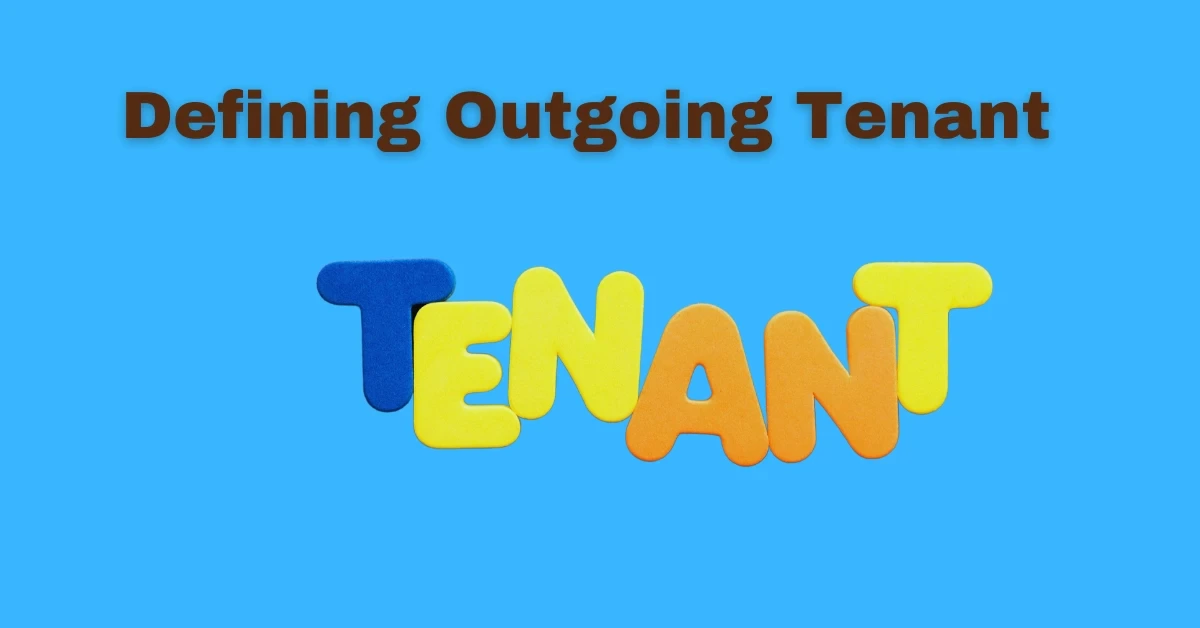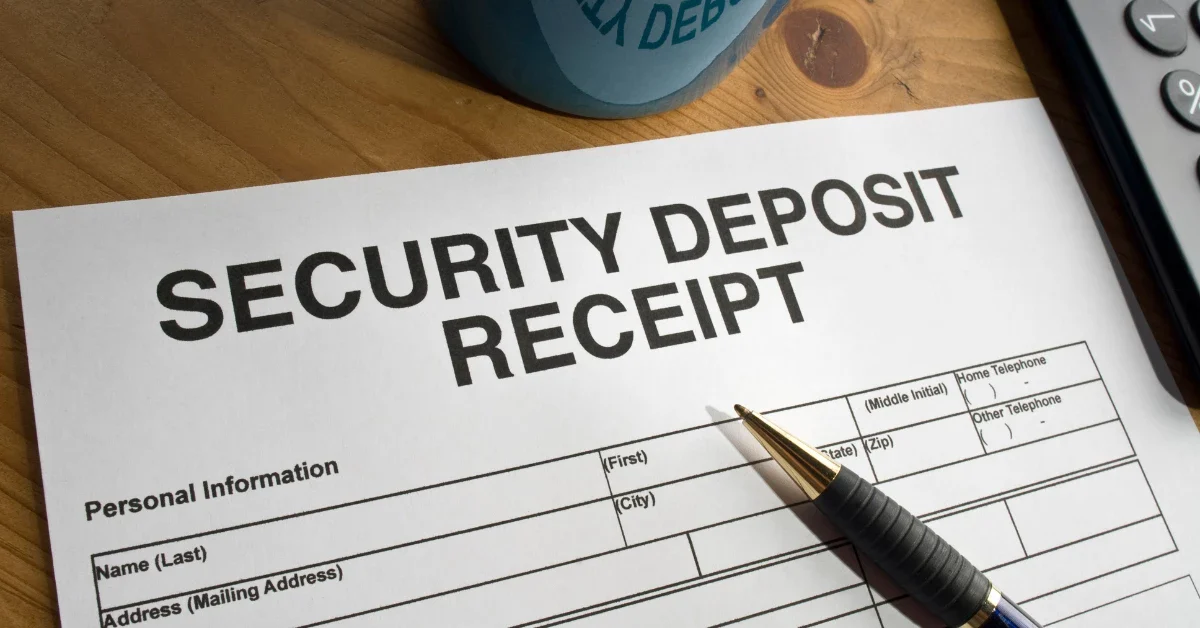What Does Outgoing Tenant Mean? The Guide to Understand
An outgoing tenant refers to a renter who is leaving or has already vacated a rented property. They are the previous occupant of the space, and the landlord is now responsible for finding a new tenant to take over the lease.
When a tenant decides to move out of a rental property, they become an outgoing tenant. This means that the landlord will now need to find a new tenant to occupy the space and fulfil the lease requirements.
Outgoing tenants may need to complete specific tasks before moving, such as cleaning and repairing the property or paying any outstanding bills.

Defining Outgoing Tenant
When tenants vacate a rental property, they are labelled as outgoing tenants. The outgoing tenant is the individual who is moving out.
Moving out can occur for a variety of reasons, including the end of a lease, expiration of the notice period, or the tenant’s decision to break the lease obligations.
An outgoing tenant may also refer to someone who is moving out of a shared rental property while others continue to reside in it.

Here are a few bullet points to remember:
- Outgoing tenants are individuals who have previously inhabited a property.
- The lease requirement has come to an end, or the tenant has decided to cease their rental contract for various reasons.
- The term ‘outgoing tenant’ is frequently used in the rental and real estate sectors.
Why Understanding The Concept Is Important For Landlords And Tenants
Landlords and tenants must comprehend what the term ‘outgoing tenant’ means because it has a significant impact on their rights and obligations.
Here are a few reasons why gaining a comprehensive understanding of this concept is essential:
- For landlords, understanding the concept of an outgoing tenant is critical to prepare the rental property for new occupants in terms of inspections, cleaning, and repairs.
- Landlords must deposit security deposits by the appropriate deadlines, which often depend on the tenant’s moving-out date.
- Identifying an outgoing tenant may be necessary to establish rent payment obligations and inform former tenants of their obligation to maintain property cleanliness.
- For tenants, understanding their status as outgoing tenants and what that implies is crucial to ensuring that they follow all applicable lease termination processes and avoid additional fees and penalties.
- Being an outgoing tenant means being aware of your deposit refund rights and obligations and providing all necessary information to ensure the refund process is completed smoothly.
Understanding The Tenant-Landlord Relationship

Brief Overview Of How Rental Properties Work
Renting a property involves an agreement between a tenant and a landlord. The tenant pays rent in exchange for the right to use the property.
The landlord is responsible for maintaining the property and ensuring it meets local safety and health regulations.
It is common practice for tenants to sign a lease outlining the terms of the agreement such as rental payments, length of tenancy, and any restrictions on use of the property.
The Tenant-Landlord Relationship With Regard To The Concept Of An Outgoing Tenant
When a tenant decides to move out of a rented property, they are known as an outgoing tenant.
The relationship between a tenant and landlord at this stage determines how smoothly the move-out process will go.
The tenant is responsible for returning the property in the same condition they received it, as outlined in the lease agreement.
The landlord will generally inspect the property to ensure it is in good condition before returning the security deposit to the tenant.
Key Responsibilities Of Tenants And Landlords
Tenants and landlords have specific responsibilities that they must uphold to ensure a positive rental experience.
Responsibilities Of Tenants:
- Paying rent on time and in full.
- Keeping the property clean and in good condition.
- Reporting any damages or issues to the landlord promptly.
- Following any restrictions outlined in the lease agreement, such as not having pets or smoking on the property.
- Giving proper notice before moving out, typically 30-60 days depending on the lease agreement.
Responsibilities Of Landlords:
- Providing a safe and habitable property that meets local codes and regulations.
- Maintaining the property and fixing any issues in a timely manner.
- Providing adequate notice to tenants before entering the property for inspections or repairs.
- Returning the security deposit as required by law and the lease agreement.
- Addressing tenant complaints and concerns in a respectful and timely manner.
Outgoing Tenant: Why It Matters
As a tenant looking for a new place to call home, hearing the term “outgoing tenant” may only seem like a minor detail.
However, this is indeed a crucial aspect of the tenant-landlord relationship that must be taken into consideration.
Let’s dive into the reasons why an outgoing tenant matters.
Importance Of An Outgoing Tenant To The Tenant-Landlord Relationship
The current tenant’s departure holds immense significance for the landlord as they require the property to be empty for a period before a new occupant can move in.
Here are some key points as to why an outgoing tenant is important to the tenant-landlord relationship:
- The landlord needs ample time to prepare the rental property after the current tenant moves out to make it suitable for a new tenant.
- The landlord needs to perform repairs, maintenance, and updates to the property, and this takes time.
- If the previous tenant did not leave the property in good condition, the landlord would need time to address those issues.
Implications Of An Outgoing Tenant For Both Tenants And Landlords
The departure of a tenant is not only important for the landlord, but it can also have implications for the tenant. Here are some key points to note:
- A departing tenant must ensure that they leave the property in an acceptable condition to avoid any penalties from the landlord.
- Tenants may sometimes need to give advanced notice of the intent to vacate the property, as stated in the rental agreement. Failure to do so could result in penalties.
- On the landlord’s end, they need to evaluate whether to hold the previous tenant’s security deposit, or they need to return it and how much amount should be returned.
Common Issues That Arise With Outgoing Tenants
Many issues can arise when a tenant is moving out, and it is essential to be aware of them. Here are a few important points:
- Disputes over security deposit amount.
- Damage or cleaning that was not done appropriately.
- Rent and bills payment residuals.
Understanding what an outgoing tenant is, and the importance and implications their departure has is essential for both tenants and landlords.
Being mindful of the common issues that arise and adhering to proper procedures can help to ensure a smooth transition for both parties involved.
Tenant’S Responsibility When Moving Out
When a tenant is moving out of a rental property, there are certain legal obligations they need to fulfil.
These obligations ensure a smooth transition from one tenant to another while protecting the landlord’s property.
Some of the legal duties include:
- Payment of rent and other charges before moving out.
- Restoration of the property to its original state, including cleaning, making repairs, and replacing damages.
- Returning all the keys to the landlord or property manager.
It is essential to read the lease agreement and understand the responsibilities before initiating the move-out process.
Common Misconceptions Among Tenants About Moving Out Process
Many tenants have numerous misconceptions about the process of moving out. The most common ones include:
- The assumption is that the rental property only needs a superficial cleaning. However, the property may require deeper cleaning, repairs, and replacement of damaged items.
- Believing that all rental properties are the same, in terms of the move-out process. However, every rental property has its distinct rules and regulations, which the tenant must adhere to.
- Thinking that the lease agreement is only important when moving in. In reality, the lease agreement has significant implications when moving out.
Steps Tenants Should Take To Prepare For Moving Out
When moving out of a rental property, tenants need to take the following steps to ensure a smooth transition:
- Notify the landlord or property manager of their intent to move out and the date they plan to vacate.
- Read the lease agreement and ensure all requirements are met before moving out.
- Begin the packing process and ensure all items are packed, marked, and secured.
- Clean the rental property, including all rooms, appliances, and carpets.
- Replace or repair all damages to the property to avoid any charges that might be accrued after the move-out process.
Landlord’S Responsibility At Tenant Move-Out
When a tenant decides to move out, it’s the responsibility of the landlord to ensure everything goes smoothly.
Here are some key points to understand about the landlord’s responsibilities with outgoing tenants:
Communication
The landlord should communicate with the tenant throughout the move-out process to avoid any misunderstandings.
Repairs and cleaning
The landlord is responsible for looking after any repairs or cleaning that needs to be done after the tenant moves out.
Security deposits
Before the tenant moves in, the landlord collects security deposits as collateral in case of any damages to the property.
Walkthrough and inspection
Upon move-out, the landlord will perform a walkthrough and inspection to assess the property’s condition.
Explanation Of Security Deposits
Security deposits are an essential aspect of the landlord-tenant relationship. Here are some key points to understand about security deposits:

- Amount: As per local law, there’s a limit to the amount the landlord can collect.
- Purpose: Security deposits are meant to cover any damages caused by the tenant, like repairing holes in the walls, cleaning fees, etc.
- Refund: If the property is left in the condition it was before the tenant moved in, and there are no dues, the landlord should refund the security deposit after the move-out.
Walkthrough Process And Inspection Process
As per the lease agreement, the landlord can enter the property to perform inspections. Here are some key points to understand about the walkthrough and inspection process:
- Schedule: The landlord should schedule a walkthrough and inspection at least a week before the tenant moves out to ensure the tenant is present.
- Documentation: Landlords should document any damages to the property. They can use this documentation as evidence to withhold the security deposit.
- Tenant involvement: The tenant has a right to be present during the walkthrough and inspection to dispute any claims made by the landlord.
Handling Unexpected Outgoing Tenant Situations
When you’re a landlord, an outgoing tenant can present various challenges, from lease violations to significant property damage.
Handling these situations requires careful planning and execution. Let’s outline what landlords should do when an outgoing tenant presents unexpected challenges.
What Landlords Should Do If The Tenant Breaks The Lease Agreement
If a tenant breaks the lease agreement, landlords must follow specific procedures to protect themselves.
Here are the steps landlords should take when faced with lease violations:
Review the lease agreement
Landlords should carefully review the lease agreement to identify any specific provisions related to lease violations and how they should be handled.
Notify the tenant
Once the lease violation has been identified, landlords should notify the tenant in writing that they are in breach of the lease agreement.
Set a deadline
Landlords should give the tenant a reasonable deadline to fix the violation. The deadline should be clearly communicated in writing.
Terminate the lease
If the tenant fails to remedy the violation by the deadline, landlords have the option to move toward eviction or terminate the lease agreement.
Policy And Procedure For Evicting A Tenant Who Is Not Compliant
If a tenant does not comply with the terms of the lease agreement, landlords may need to initiate eviction proceedings. To do so, landlords should follow these steps:
Serve the tenant with an eviction notice
Landlords must serve the tenant with a formal eviction notice. The notice should include the reason for eviction and a deadline for the tenant to vacate the property.
File an eviction lawsuit
If the tenant does not vacate the property by the deadline, landlords can file an eviction lawsuit in court.
Attend the hearing
Landlords should attend the hearing and provide evidence supporting the case for eviction.
Obtain a writ of possession
If the court rules in favour of the landlord, they can obtain a writ of possession. This document allows them to remove the tenant from the property and regain control.
How To Handle Property Damages Caused By The Outgoing Tenant
When a tenant vacates a property, landlords should perform a thorough inspection to identify any damages caused by the outgoing tenant.
To handle property damages caused by the outgoing tenant, landlords should follow these steps:
- Document the damages: Landlords should document any damages with pictures and descriptions. A move-in/move-out checklist can be helpful.
- Deduct the damages from the security deposit: Landlords can deduct the cost of damages from the tenant’s security deposit. The remainder must be returned to the tenant.
- Pursue legal action: If the cost of damages exceeds the security deposit, landlords can pursue legal action to recover the remaining funds.
Clear Communication And Documentation
When renting a property, both the tenant and landlord need to have a clear understanding of each other’s expectations.
This means that it’s essential to establish open communication from the beginning. The following are some ways that clear communication can benefit both parties.
- Clarifying rental agreements, responsibilities, rent payments, and maintenance procedures at the beginning of the tenancy to avoid future disputes or misunderstandings.
- Creating a tenant-landlord relationship built on transparency and trust.
- Allowing tenants to express their concerns and enabling landlords to address them promptly.
- Establishing a channel of communication for emergencies.
Documenting Agreements And Discussions Between Tenant And Landlord
It is essential to document all agreements or discussions between tenant and landlord to safeguard both the tenant and landlord’s interests.
This documentation could be in the form of written agreements and records of communication.
The following are some reasons why documenting your tenancy is crucial for both parties:
- Written agreements and records of communication can help avoid miscommunication and prevent future disputes.
- Documentation serves as proof of agreements, payments, and repairs, which both parties can refer to in case of any misunderstanding.
- Documentation can be used for legal purposes if required.
Understanding The Moving Out Timeline
Are you planning to move out of your rental property soon? As an outgoing tenant, you need to be aware of the moving-out timeline to ensure a smooth transition.
Here’s what you need to know.
Explanation Of The Usual 30 Days’ Notice
When you decide to vacate your rental property, you need to provide notice to your landlord.
In most cases, you’re required to give at least 30-day notice, as this is the standard timeframe in many states.
Your rental agreement or lease may have a specific clause regarding the notice period. Be sure to read through it carefully.
Here’s what you should include in your notice:
- The date you’re planning to move out.
- Your forwarding address.
- Your contact phone number.
It’s essential to provide your notice in writing, either via mail or email, and ask for a confirmation receipt.
What Tenants And Landlords Should Do Before The Move-Out Date
Before the move-out date, there are a few essential tasks that both tenants and landlords should do to make the process go smoothly. These tasks include:
For tenants:
- Take care of all repairs and cleaning needed in the rental unit.
- Remove all personal items and clean the rental unit thoroughly.
- Turn in the keys to the landlord.
- Provide a forwarding address for the return of a security deposit.
For landlords:
- Inspect the rental unit for damages.
- Return the security deposit to the tenant (if there is no damage).
- Provide an itemized list of deductions made from the security deposit (if any).
- Complete the necessary paperwork, including the return of any unused prepaid rent.
What To Do During The Move-Out Day
On the move-out day, tenants should ensure the following:
- Pack and move their belongings outside the rental unit.
- Clean every part of the rental unit, ensuring that the unit is in its original condition.
- Return all keys to the landlord.
- Confirm that the landlord has an appropriate forwarding address for the return of the security deposit.
Landlords, on the other hand, should:
- Inspect the rental unit for any damage incurred during the tenant’s occupancy.
- Finalize any move-out paperwork.
- Return the security deposit or provide an itemized deduction list.
Frequently Asked Questions Of What Does Outgoing Tenant Mean
What Is An Outgoing Tenant?
An outgoing tenant refers to a person who previously rented or leased a property and is moving out.
What Responsibilities Does An Outgoing Tenant Have Before Moving Out?
The outgoing tenant is responsible for cleaning the property and making necessary repairs before moving out.
Can An Outgoing Tenant Terminate A Lease Early?
An outgoing tenant may be able to terminate a lease early depending on the terms outlined in the lease agreement.
What Happens To The Security Deposit Of An Outgoing Tenant?
The security deposit of an outgoing tenant will be returned once the property has been inspected and all obligations have been fulfilled.
Conclusion
Empower your knowledge of rental transitions by understanding an outgoing tenant. This term signifies someone leaving their rented property and moving on to their next chapter.
Remember, your real estate journey is a cycle of continuous movement – you’re just one step away from being the next outgoing tenant!
Reference
https://www.lawinsider.com/dictionary/outgoing-tenant